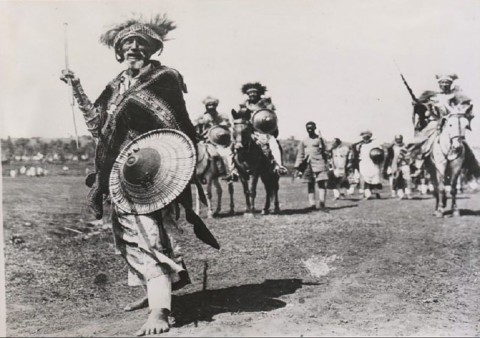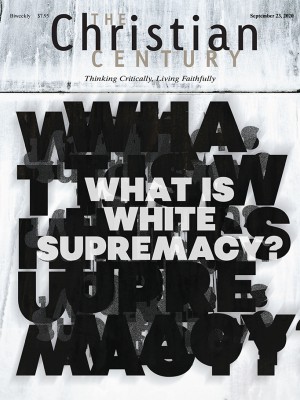To understand African Christianity, remember the Battle of Adwa
In 1896, a Christian army from Ethiopia defeated the Italians.

The historic relationship between Christianity and imperialism naturally causes grave dilemmas for modern believers. But on at least one celebrated occasion, it was actually a great Christian army that decisively triumphed over empire—and resisted conquest for a generation. Anyone interested in the story of modern African Christianity needs to know about the Battle of Adwa.
After Italy was united as a modern nation in 1861, the country’s leaders were determined to announce its arrival on the global stage by joining the race for empire. Their options were somewhat limited, as other great powers had already grabbed so much, so Italian hopes turned to the Red Sea coast of East Africa, to Eritrea—and to the ancient Christian kingdom of Abyssinia, or Ethiopia. From the earliest encounters, however, it was obvious that the Ethiopians did not fit the racist stereotype of howling tribesmen armed only with spears who would cower before the weight of European technology. A major defeat at Dogali in 1887 gave the Italians a powerful thirst for revenge, and open war broke out in 1894.
Read our latest issue or browse back issues.
Once again, the Italians struggled against well-armed and disciplined Ethiopians, led by their emperor Menelik II. Menelik was a highly cultured man who spoke several European languages, along with African tongues, and he had a glorious vision of his country’s past and its faith. As he famously proclaimed, “Ethiopia has been for 14 centuries a Christian island in a sea of pagans.” A skilled diplomat, he persuaded the Russians—fellow Orthodox believers—to supply him with weaponry and advisers.
The new war culminated on March 1, 1896, at Adwa, when the Italian force of around 18,000 allowed itself to be drawn into battle against an Ethiopian army at least six times larger. The Italian force was utterly destroyed as a fighting unit, suffering at least 6,000 dead and losing all artillery and equipment. Only Menelik’s diplomatic sense and restraint prevented his forces from sweeping up all the now defenseless Italian territory that remained on the Red Sea. Why risk his gains when he already had achieved everything he needed? (The campaign is expertly described in Raymond Jonas’s 2011 study The Battle of Adwa.)
The sheer scale of the European catastrophe demands attention. This was a period when White empires might lose the occasional battle, as the British had to the Zulus some years before, but they certainly did not lose whole wars to despised Black Africans. Nor did the familiar stereotype allow for a situation where African commanders outmaneuvered imperial invaders and deployed modern weaponry against them. To put such a reversal of expectations in a US context, we would have to imagine an alternate world where Native forces both triumphed at Little Bighorn and then went on to secure the independence of the whole Black Hills region for a generation.
That context explains the very long shadow cast by Adwa, on Europeans and Africans alike. Italy recalled the battle as an epic humiliation, a horror made all the worse by propaganda tales of the atrocities inflicted on their prisoners of war. The quest for revenge was fulfilled, briefly, when Mussolini’s regime launched its extraordinarily brutal invasion of Ethiopia in 1935, slaughtering vast numbers of civilians.
Where Italians felt visceral humiliation, Africans were astonished and inspired, and for some, Menelik’s victory created something like a messianic mood. For the first time in generations, Black Africans could find hope, and specifically from the achievements of an idealized Christian warrior.
Already in the 1880s, some African Christians were defecting from the missionary churches that were so closely affiliated with the ruling White empires. Soon, especially in South Africa, many of the emerging independent churches started claiming Ethiopian identity, and after Adwa, that Ethiopian appeal acquired a new vogue. The new churches often cited as their foundation text the words of Psalm 68, which proclaims, “Let Ethiopia hasten to stretch out her hands to God,” and they explored visions of Christian identity spreading across Africa. In subsequent years, those independent or Ethiopian churches have fallen behind other more familiar global denominations, such as the Catholics, Anglicans, or Methodists, but they still remain in place, and their insights have been incorporated into the theology that developed on the continent over the next century.
Adwa remained a touchstone of African nationalism, which made Ethiopia a kind of Zion. Marcus Garvey cited the victory to justify his Back to Africa movement, and it was often recalled by the generation of leaders who won independence in the 1950s and 1960s. Ethiopia also became the holy land of the Rastafarians, who took their name from a title of the Ethiopian emperor Haile Selassie, Ras Tafari. Around the world, Rastafarians still celebrate Adwa Day as an African triumph.
If you want to understand modern African faith, remember Adwa.
A version of this article appears in the print edition under the title “Remember Adwa.”






